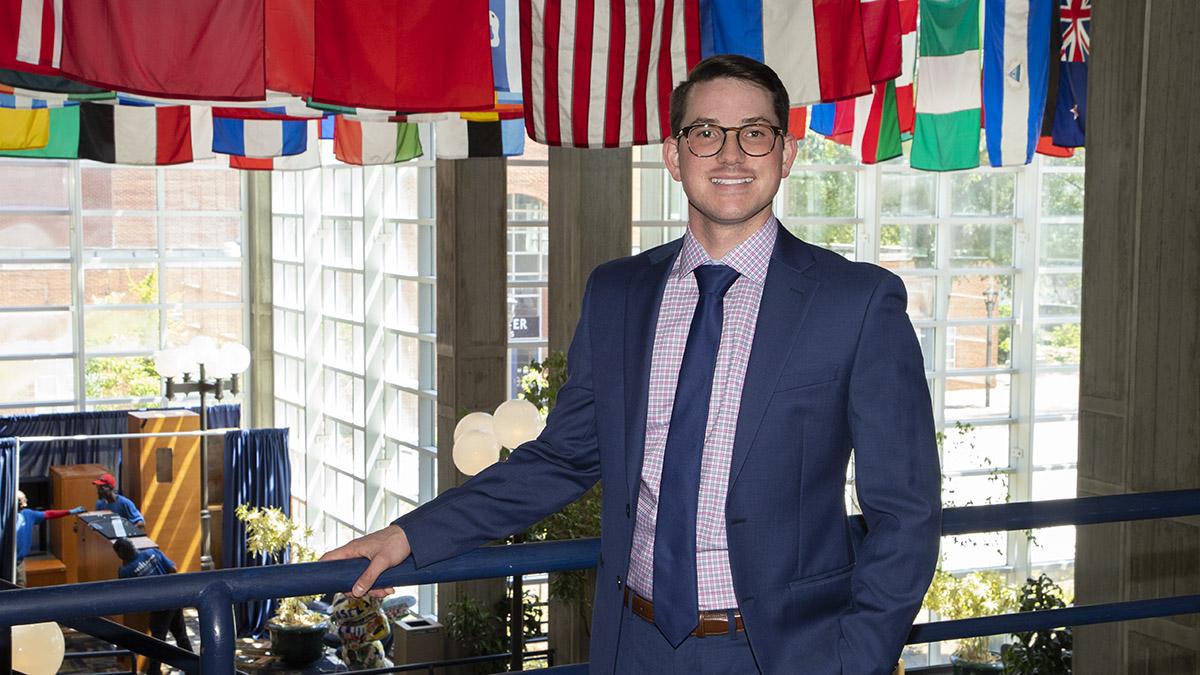Biomedical engineering Ph.D. student PJ Jarquin has always been passionate about serving his campus and his fellow students. He has a significant chance to do that this year as executive vice president of the Graduate Student Government Association (GSGA) at Georgia Tech.
It may seem like a big responsibility on top of the all-consuming work of pursuing a doctorate, but it’s the kind of thing Jarquin has been doing his whole college career — first as an undergraduate and then as an executive cabinet member in Tech’s Graduate SGA last year.
“Research and lab work and classes are important, but GSGA is something for me to kind of get away from all the research while still being productive with my time and making a positive impact,” said Jarquin, who is entering his third year of doctoral work in the Wallace H. Coulter Department of Biomedical Engineering at Georgia Tech and Emory University. “I really enjoy working to make campus a better place, and SGA has always been my avenue or outlet.”
Jarquin was elected this spring alongside Stephen Eick, a Ph.D. student in computer science. They’ll serve over the next year in what Jarquin said is a critical time as more people return to campus and find ways to reconnect and rebuild some of the community that has been lost during the coronavirus pandemic.
“Definitely our main priorities center around student well-being and mental health. There are grad students, and of course also undergrads, who really never got to interact with their peers as much. The biggest challenge is, how do we transition safely to more meaningful interactions that aren't virtual,” Jarquin said, noting that returning to large in-person events will be an adjustment — albeit an important one.
Jarquin said the pandemic has underscored the importance of mental health for students, so he expects he and Eick will work with campus leaders to ensure services meet students where they are.
“It's not just adding counselors,” he said, praising the satellite counseling program that has put a therapist right in the Whitaker building and other academic spaces to improve access for students. “There are particular populations of students that, for counseling sessions, it’s important to see someone who understands your specific struggles or specializes in what you're dealing with. It'd be nice, maybe, for you to have profiles of the counselors and what they specialize in, what they look like, and the kind of experience they have, to select a particular counselor who suits your unique needs.
“We’re going to develop a lot of initiatives around supporting mental health for students, well-being, and engagement.”
“Research and lab work and classes are important, but GSGA is something for me to kind of get away from all the research while still being productive with my time and making a positive impact. I really enjoy working to make campus a better place, and SGA has always been my avenue or outlet.”
Of course, Jarquin will continue to push forward on his graduate work with Coulter BME Professor Sakis Mantalaris and Emory Associate Professor Nicki Panoskaltsis, who co-lead the Biological Systems Engineering Lab. Jarquin studies the process of red blood cell formation called erythropoiesis using a unique 3D model that mimics the architecture of bone marrow and produces functional cells so the team can study the linkages between the marrow microenvironment and the cells.
“The only kind of model that usually can do that is a mouse model. So being able to link that to the human condition really interests me,” Jarquin said. In particular, he focuses on anemia and is using the model to find possible treatment targets for the disease. “It's mainly the unknown — and I guess that's science in general — it's just that there are a lot of unknowns or unanswered questions, and that is what interests me the most about it.”
Jarquin came to Coulter BME after studying biomedical engineering at Mississippi State University. He said he was drawn to the Mantalaris and Panoskaltsis lab because of the collaboration between a bioprocess engineer and a clinician — a hallmark of the Department he discovered early on in his search for graduate programs.
In fact, it was a talk by Coulter BME Associate Professor Manu Platt at the Biomedical Engineering Society conference in Atlanta that stuck with Jarquin as he was exploring programs.
“One of the first things that he stressed was that the research isn't as important as whoever is going to be guiding you through that research,” Jarquin said, “so that's the approach I took [looking for an advisor and a lab].”
Perhaps unsurprisingly, Jarquin already has an idea of how he’ll blend service and uncovering the unknown even after he leaves Emory and Georgia Tech. He plans to pursue a career as a research scientist at a federal agency, where he wants to ensure underrepresented voices are heard.
“For me, it's like serving the country,” he said. “You're not doing it for a financial gain for a company; the research that's being done belongs to the people, belongs to us.”
Latest BME News
Jo honored for his impact on science and mentorship
The department rises to the top in biomedical engineering programs for undergraduate education.
Commercialization program in Coulter BME announces project teams who will receive support to get their research to market.
Courses in the Wallace H. Coulter Department of Biomedical Engineering are being reformatted to incorporate AI and machine learning so students are prepared for a data-driven biotech sector.
Influenced by her mother's journey in engineering, Sriya Surapaneni hopes to inspire other young women in the field.
Coulter BME Professor Earns Tenure, Eyes Future of Innovation in Health and Medicine
The grant will fund the development of cutting-edge technology that could detect colorectal cancer through a simple breath test
The surgical support device landed Coulter BME its 4th consecutive win for the College of Engineering competition.








